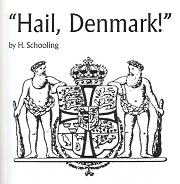“Hail, Denmark!” A Mother Nation of Modern Israel
By H. Hartland Schooling

The Northern European Kingdom of Denmark comprises the peninsula of Jutland; an archipelago which includes Zealand and various islands; the outlying islands of Bornholm and the Faroes and the dependency of Greenland. Denmark was separated from Sweden in 1523 and from Norway in 1815.
Danmark, as it is known to its own people, appears to have been the first settled by a branch of the tribe of Dan who reached the islands of Denmark by sea, apparently from Greece. Eldad, the Jewish historian, tells us that during the reign of Jeroboam, or about 970 B.C.,
“Dan refused to shed his brother’s blood, and rather than go to war with Judah, he left the country and went in a body to Javan (Greece) and to Danmark.”
These people named their new home Danmares, meaning Dan’s country.
The modern Danes, however, are unlikely to have descended purely from Danite stock, for there is considerable traditional evidence to suggest that Denmark was a popular base for other Israel peoples. The Normans, for example, who are believed to have been largely of Benjamite stock, were domiciled for some time in Denmark before taking possession of Normandy. The Norman invasion of Britain is, even today, described in Danish history books as a civil war between two branches of the Danish people. A man was, again, the heraldic sign of Reuben and, as will be seen from the illustration below, two men form the supporters of the present Danish arms. It should also be remembered that a large part of England, traditionally Ephraim in origin, has been settled by people who at least came from Denmark.
The very close ties which have, for centuries, connected Denmark with the rest of the Celto-Saxon world are too obvious to call for emphasis here. In Denmark, a guide book written for English tourists, Clive Holland has very aptly pointed out that
“Probably no other country in Europe will impress the English visitor more markedly than does Denmark with the things we have in common rather than the things in which we differ.”
In a modern political sense, Denmark is a crowned democracy, and it may be worth pointing out that Iceland, a one-time Danish dependency, was given in 1918 a free and sovereign status identical with that of a British Dominion or an American Commonwealth. Indeed, it is reasonably safe to assume that the five million Danes can be identified with the Protestant remnant of the woman (Israel’s) seed referred to in the twelfth chapter of Revelation. Like their kinsfolk in Holland and Britain, the Danes are at present enmeshed in the Babylonian web of Europe, but we may be reasonably sure that Denmark will, at no far distant date, be able to throw off this incubus and to join in full communion with its companions, the whole House of Israel.
Home/Hjem Articles/Artikler |